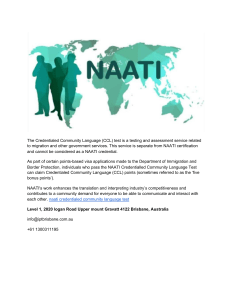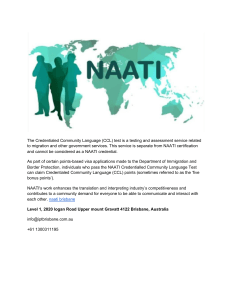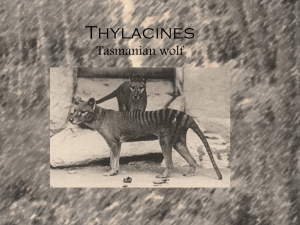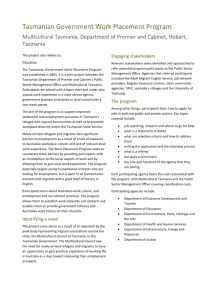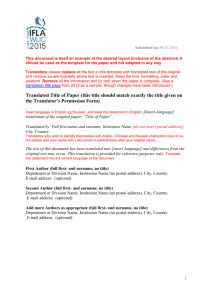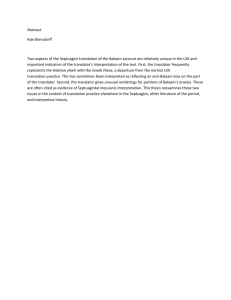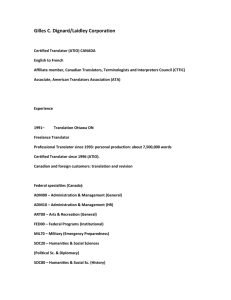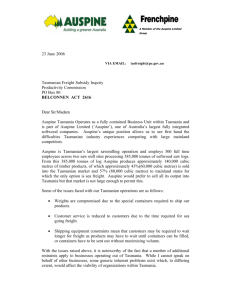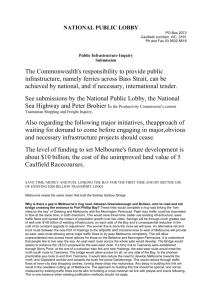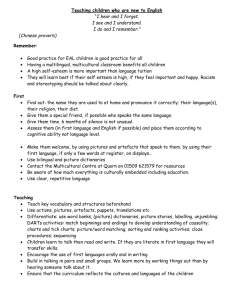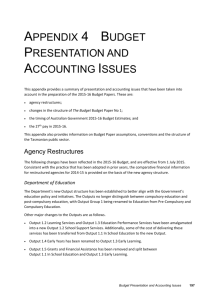Multilingual information planning - Department of Premier and Cabinet
advertisement
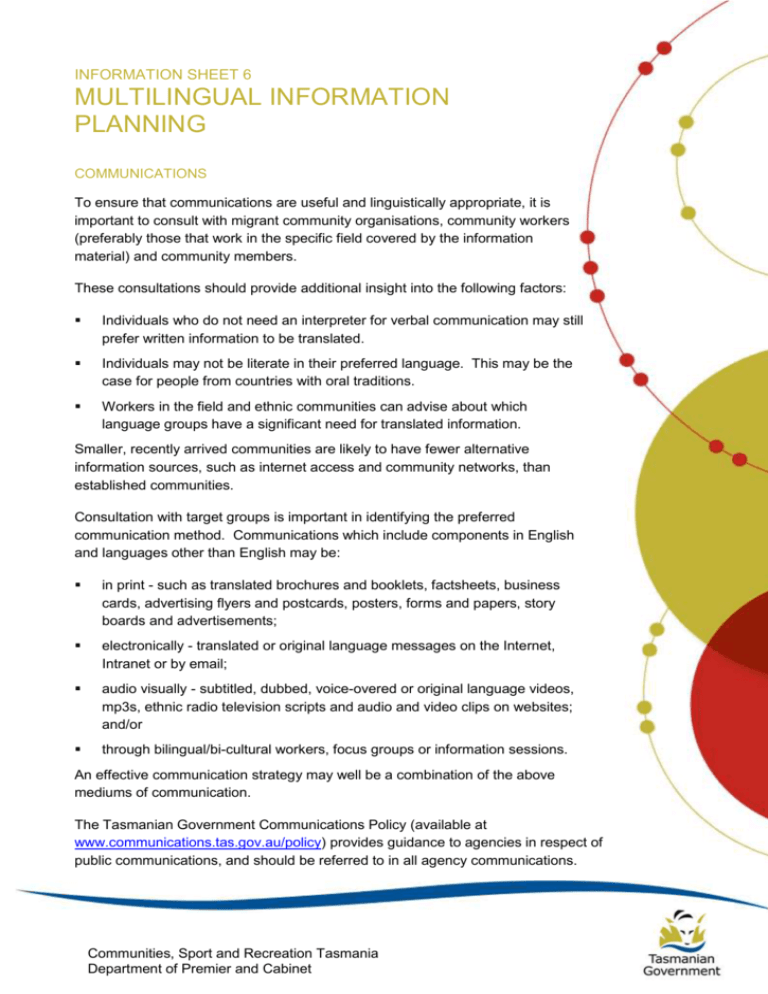
INFORMATION SHEET 6 MULTILINGUAL INFORMATION PLANNING COMMUNICATIONS To ensure that communications are useful and linguistically appropriate, it is important to consult with migrant community organisations, community workers (preferably those that work in the specific field covered by the information material) and community members. These consultations should provide additional insight into the following factors: Individuals who do not need an interpreter for verbal communication may still prefer written information to be translated. Individuals may not be literate in their preferred language. This may be the case for people from countries with oral traditions. Workers in the field and ethnic communities can advise about which language groups have a significant need for translated information. Smaller, recently arrived communities are likely to have fewer alternative information sources, such as internet access and community networks, than established communities. Consultation with target groups is important in identifying the preferred communication method. Communications which include components in English and languages other than English may be: in print - such as translated brochures and booklets, factsheets, business cards, advertising flyers and postcards, posters, forms and papers, story boards and advertisements; electronically - translated or original language messages on the Internet, Intranet or by email; audio visually - subtitled, dubbed, voice-overed or original language videos, mp3s, ethnic radio television scripts and audio and video clips on websites; and/or through bilingual/bi-cultural workers, focus groups or information sessions. An effective communication strategy may well be a combination of the above mediums of communication. The Tasmanian Government Communications Policy (available at www.communications.tas.gov.au/policy) provides guidance to agencies in respect of public communications, and should be referred to in all agency communications. Communities, Sport and Recreation Tasmania Department of Premier and Cabinet PLANNING To ensure that communications are useful and linguistically appropriate, it is important to consult with migrant community organisations. Multilingual communication requirements need to be planned based on market research and the use of client profile data which identifies language spoken, literacy levels, age, gender and year of arrival in Australia. Planning also includes dissemination strategies and evaluation and feedback mechanisms. Language choices should be based on in-house locally-researched information as well as external data sources such as the Australian Bureau of Statistics Census and other demographic data. The choice of media used to communicate with clients also needs to be carefully considered taking into account factors such as the percentage of people who do not speak English well or at all, and/or who have access to the internet. It is recommended that ethnic communities, business associations and peak agencies be included in decisions about information needs, formats and dissemination strategies. Agencies should organise their own networks and may obtain advice from the Department of Premier and Cabinet’s Communities, Sport and Recreation Tasmania Division about culturally and linguistically diverse communities in Tasmania. The Division is currently preparing a series of Tasmanian community profiles for new and emerging communities. The previous Department of Immigration and Citizenship has also developed community profiles to better assist agencies understand the background and needs of Humanitarian program arrivals. These profiles are available at: www.immi.gov.au Your ethnic community network may be available to give feedback on a draft multilingual product. This checking for cultural appropriateness is a vital part of any multilingual information strategy and will include feedback on the appropriateness of photography and artwork (eg cartoons) as well as language. Agencies need to balance the imperatives of getting information to large identified groups with the information requirements of smaller or emerging groups and regional/isolated communities. The marketing of government products and services in multilingual form to international destinations requires sensitivity to local acceptability factors. Tasmania’s multicultural community is an ideal resource for product testing. Planning can include professional development of bilingual staff to encourage them to attain National Accreditation Authority for Translators and Interpreters (NAATI) certification as a bilingual worker and use their language skills in the workplace, or to become a credentialed interpreter or translator. Multicultural Language Services Guidelines for Tasmanian Government Agencies Communities, Sport and Recreation Tasmania Department of Premier and Cabinet 2 ORGANISING TRANSLATIONS Selecting languages for the translation of information can be challenging. Considering languages with the highest number of speakers may not necessarily be the most targeted or useful approach. Often what is required is an understanding of the target audience, their language requirements and the type of materials that are to be translated. Factors to consider collectively when deciding the appropriate languages for translated communication materials include product usage, reach, language needs, and the level of language. Information intended for translation for members of the public should be in simple and plain English. A translation will be far more effective if the original English text is clear and stylistically consistent. The term ‘plain English’ refers to clear language that a target audience can readily understand and act on the first time that they read it. Plain English is effective because it: focuses on the message; uses no more words than are necessary; and avoids jargon and complex language. The translation of documents should be performed by a NAATI credentialed translator whenever possible. Using credentialed translators provides agencies with more confidence that the product will be accurate, professional and appropriate. NAATI translator credential levels include Professional Translator, Advanced Translator and Paraprofessional Translator. Tasmanian Government agencies should use NAATI credentialed translators at the Professional level where available, and Paraprofessional as the next option. NAATI Recognised Translators can be used for new and emerging languages in which there are no Professional or Paraprofessional Translators available. Verification through a NAATI stamp may be required for legal documents (such as translations of birth certificates) or driver’s licences which are used to prove a person’s identity. It is recommended that translations are either checked by a second translator or tested with the particular language group to ensure the most accurate translation in terms of context and intended message. Agencies’ policies and procedures should state who should and should not be engaged as a translator and provide advice on the approval process required for material to be translated into another language. Multicultural Language Services Guidelines for Tasmanian Government Agencies Communities, Sport and Recreation Tasmania Department of Premier and Cabinet 3 DISTRIBUTING INFORMATION Agencies should consider which distribution methods are most effective for the communities they wish to target. The Tasmanian Government encourages the use of the nationally endorsed interpreter symbol when distributing information. Distribution options to consider include: using community and multicultural broadcasters such as Hobart FM 96.1 (south), City Park Radio (north) and community newspapers; providing information to settlement service providers, ethnic community organisations and peak and service bodies such as the Migrant Resource Centre and the Multicultural Council of Tasmania; providing information through local churches, mosques, temples and cultural clubs; and via the Department of Premier and Cabinet’s, Communities, Sport and Recreation Division Multicultural Communities Distribution List by emailing multicultural@dpac.tas.gov.au. Multicultural Language Services Guidelines for Tasmanian Government Agencies Communities, Sport and Recreation Tasmania Department of Premier and Cabinet 4
